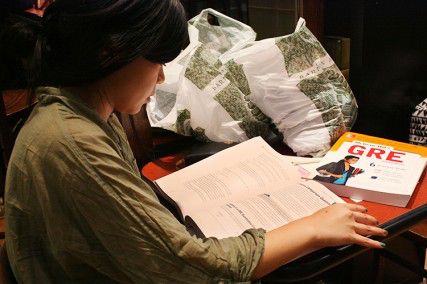
As the job market slowly recovers, the number of graduate school test-takers and international students pursuing graduate studies in natural science fields has increased in the last year, according to a recent study.
The Educational Testing Services released the study Thursday and concluded that new trends indicate Graduate Record Examinations test-takers from this year are younger, more inclined to study the natural sciences and less likely to be female than in previous years.
“The overall impression that people need to pursue graduate school because they are having a tough time getting a job seems to be a relatively accurate general perspective,” said Rebekah Alexander, assistant director of Admissions and Financial Aid at BU’s Graduate School of Arts and Sciences. “…This could be a trend in undergraduate advising — maybe they are telling students to take it as a backup.”
The GRE is a standardized test used for admission to graduate programs in an array of disciplines, including education, engineering, humanities, natural sciences and social sciences.
“The GRE revised general test is the most widely used admissions test for graduate and business school,” said Christine Betaneli, BU’s Educational Testing Service spokeswoman. “So, looking at a report like this is a good indicator of the individuals who are demonstrating interest in graduate studies.”
Betaneli said although the GRE does not analyze test-takers’ professional goals, the increase in test-takers pursuing science-based fields is likely a result of the growing number of job opportunities in that field.
“It may be because they are looking at what job opportunities are available for people with that degree,” Betaneli said. “There is an increased public interest in the STEM [science, technology, math and engineering] field. Perhaps that is drawing prospective students from those majors.”
From 2011-12 to 2012-13, GRE test-takers who indicated natural sciences as their intended field of study increased from 27 percent to 32 percent. This is a trend that BU officials attributed to the lucrative job opportunities in the field.
GRE test takers in 2012-13 were also younger and less likely to be female than in the previous year, according to the study. Foreign students continue to have a strong presence in the GRE test-taking population, comprising of one-third of total GRE test-takers.
Francois Exilhomme, admissions manager at BU’s School of Social Work, said he has seen an increasing number of students, particularly from the international population, pursuing careers in more lucrative fields such as engineering, business and finance.
“Students are unable to get federal aid as an international student, so it’s difficult,” he said. “I would expect them to obtain business or engineering degrees so they have a safety net.”
Deep Shah, a second-year graduate student in the College of Engineering, said his chosen course of study should give him an edge in the job market.
“My undergrad degree was biology, which is really broad, so now I am doing a degree in bioinformatics, which is a lot more specific to job markets,” he said. “… There is a better opportunity in STEM fields than other fields.”
Sean Tu, a second-year business student in BU’s Metropolitan College from Taiwan, said graduate school serves as a pipeline for foreign students to obtain a U.S. citizenship.
“The majority of students who want citizenship in the United States find that it’s a good opportunity for them to attend graduate school, because it’s only two years and they can find a job,” Tu said.
Third-year School of Management graduate student Derek Cohen said many other students in his program are younger, more recent college graduates.
“A lot of the MBA students in my classes seem like they are younger,” he said. “Maybe more people are coming right into graduate school from undergrad. The ages vary — they’re across the board, but I have noticed that in the last couple years there have been a lot of students in my classes that seem to be right out of undergrad with no work experience.”
This is an account occasionally used by the Daily Free Press editors to post archived posts from previous iterations of the site or otherwise for special circumstance publications. See authorship info on the byline at the top of the page.



